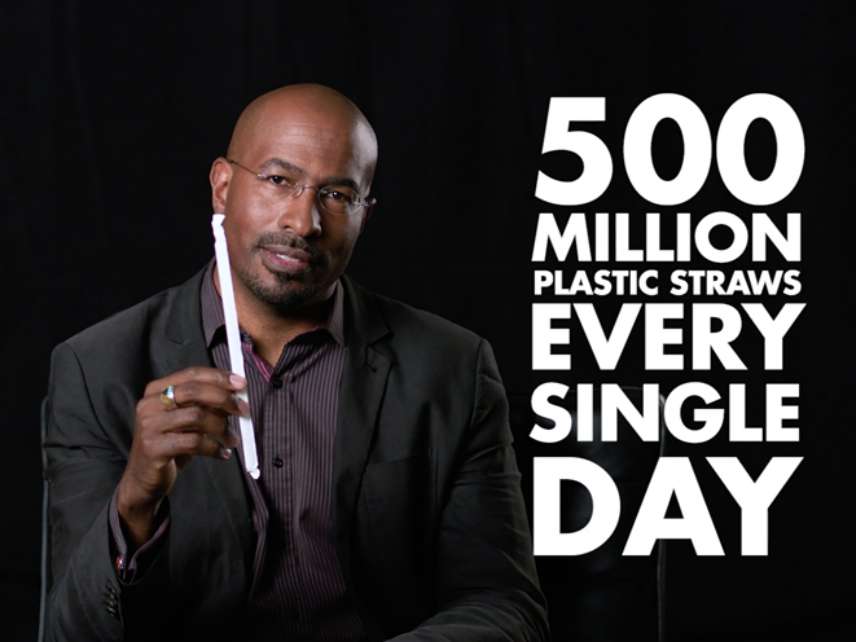Seattle's First-in-the-Nation Straw Ban Goes Into Effect. More Will Follow.
The latest environmental craze claims another victory.

Seattle continues to play its role as an incubator of bad policy ideas by imposing the nation's first ban on plastic straws. First articulated in September of last year, the new ban officially went into effect on Sunday.
The law prohibits all food-service businesses, including restaurants, coffee shops, delis, and pubs, from offering any disposable straw or utensil to patrons unless they specifically request one. Should a customer ask for one, said straw will have to be not just biodegradable but compostable under Seattle's exacting city-level standards. Violators will be hit with $250 fines.
Seattleites will still probably see plastic straws around town for the next couple months, as plenty of businesses are still scrambling to make the switch to their compostable counterparts.
Caroline Lee of Young Tea, a boba tea shop in downtown Seattle, told Reason last week that she was still in the process of working with her supplier in Taiwan to make a straw that meets the new regulation. Lee says the new straws are six to seven times more expensive and fall apart from exposure to high heats, requiring special packaging when shipped by sea. She is considering having a test batch flown in by air, which will raise costs further.
Lee expressed her hope that the city would give business owners a grace period and even compensate them for the extra costs they are being asked to take on. So far, compensation seems out of the question. But there will, mercifully, be a grace period. Ellen Pepin-Cato of Seattle Public Utilities (SPU)—the agency responsible for enforcing the ban—tells The Seattle Times that the focus for now would be on "continuing outreach and assistance to businesses to help them come into compliance, rather than enforcement."
As businesses in the Emerald City struggle to comply with the new straw ban, other jurisdictions are passing or seriously considering bans of their own.
Vancouver, Canada, prohibited straws back in May, much to the chagrin of boba tea shop owners, plastics manufacturers, and disability advocates (who take issue with banning an essential utensil for those who have difficulty bringing cup to mouth). Several New York City councilmembers are trying to do the same in their city, introducing legislation in May that would ban straws for everyone who doesn't need one for medical purposes.
These councilmembers are being spurred on by the Lonely Whale, an environmental group that sees straws as a "gateway plastic" that could spawn more bans of more plastic items. Lonely Whale played a crucial role in Seattle's ban with its Strawless in Seattle campaign. They've since deployed actor Adrian Grenier to make videos and co-sign op-eds demanding that the Big Apple follow Seattle's lead and ditch single-use straws altogether.
An exhausting number of celebrities and corporations are jumping aboard the craze too. From Tom Brady and Ikea to Calvin Harris and McDonald's, everyone is telling you to stop sucking and start think about the planet.
They'll sometimes claim that Americans use 500 million straws a day. Always they'll argue that ditching straws is an unambiguous good for our oceans filling with plastic. Neither argument is very convincing.
That 500 million straw a day figure—cited by The Washington Post yesterday—has been debunked as the product of a nine-year-old's research. But even if that stat were accurate, straw bans are unlikely to help the planet much. The U.S. is responsible for a tiny portion of the world's marine plastic waste (less than 1 percent), as are plastic straws themselves (about .03 percent). The best approach to the problem of oceanic plastic pollution is better waste management systems in the developing world, not bans on plastic products.
It is easy to see a parallel between this movement and the once-popular urge to prohibit or restrict the use of plastic bags. Likewise spurred on by bad stats and feel-good activism, San Francisco became the first major city to ban plastic bags in 2007, with prohibitions later moving on to the usual suspects of Seattle, Los Angeles, Austin, and eventually the entire state of California. But once the easy wins were out of the way and consumers became increasingly irritated at the loss of convenience, a backlash set in. Ten states have passed preemption ordinances prohibiting municipalities from imposing their own bag bans (among them Minnesota, which overturned a Minneapolis ban). Last week the Texas Supreme Court ruled that Austin's bag ban was illegal under preexisting state law.
Something similar will likely happen with plastic straws. As the novelty of straw bans wear off and as their costs become more apparent, momentum will slow, and hopefully reverse. That will leave a handful of municipalities clinging to their prohibitions, a few states with straw ban preemption laws, and a lot of consumers and businesses hoping just to be left alone.
